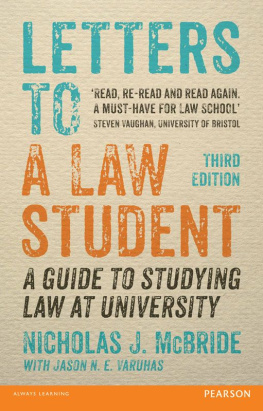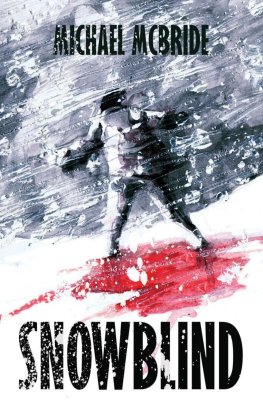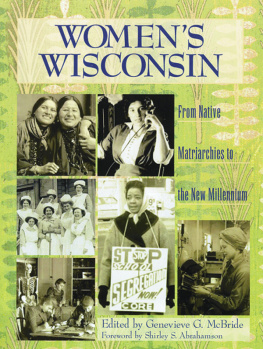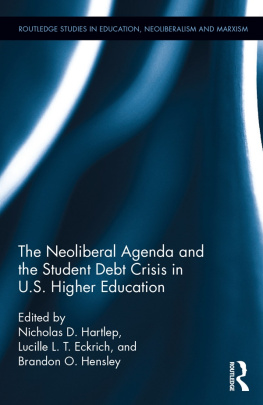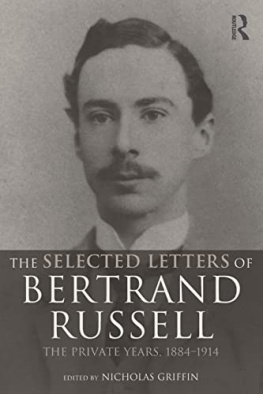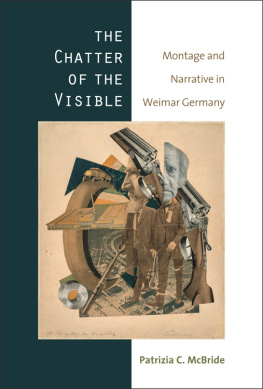Nicholas J McBride - Letters to a Law Student: A Guide to Studying Law at University
Here you can read online Nicholas J McBride - Letters to a Law Student: A Guide to Studying Law at University full text of the book (entire story) in english for free. Download pdf and epub, get meaning, cover and reviews about this ebook. City: London, year: 2013, publisher: Pearson, genre: Politics. Description of the work, (preface) as well as reviews are available. Best literature library LitArk.com created for fans of good reading and offers a wide selection of genres:
Romance novel
Science fiction
Adventure
Detective
Science
History
Home and family
Prose
Art
Politics
Computer
Non-fiction
Religion
Business
Children
Humor
Choose a favorite category and find really read worthwhile books. Enjoy immersion in the world of imagination, feel the emotions of the characters or learn something new for yourself, make an fascinating discovery.
- Book:Letters to a Law Student: A Guide to Studying Law at University
- Author:
- Publisher:Pearson
- Genre:
- Year:2013
- City:London
- Rating:3 / 5
- Favourites:Add to favourites
- Your mark:
- 60
- 1
- 2
- 3
- 4
- 5
Letters to a Law Student: A Guide to Studying Law at University: summary, description and annotation
We offer to read an annotation, description, summary or preface (depends on what the author of the book "Letters to a Law Student: A Guide to Studying Law at University" wrote himself). If you haven't found the necessary information about the book — write in the comments, we will try to find it.
Letters to a Law Student: A Guide to Studying Law at University — read online for free the complete book (whole text) full work
Below is the text of the book, divided by pages. System saving the place of the last page read, allows you to conveniently read the book "Letters to a Law Student: A Guide to Studying Law at University" online for free, without having to search again every time where you left off. Put a bookmark, and you can go to the page where you finished reading at any time.
Font size:
Interval:
Bookmark:

To the magical
Isabel, Ines and Luca
I miss you very much, dear friends;
you are my joy and my crown
(Phil. 4:1)
This book has been written for anyone who is doing, or thinking about doing, a law degree at university. The book comprises a series of letters to a law student, Alex. The first letter is sent to Alex while Alex is doing A-Levels and thinking about doing a law degree at university. The final letter finds Alex just about to graduate from university, having done a law degree. The thirty letters in between track Alexs progress from school to university, giving advice to Alex on various issues such as how to study law, how to write legal essays, and how to revise for exams.
Alex does not exist, and no one who is thinking about studying law or actually studying law will share all of the concerns that prompt the letters to Alex set out in this book. Some letters will be of more relevance to you than others. If you are considering studying law at university then you should read chapters as required.
One of the themes of this book is that to remember information, it is not enough to read it; you have to use it as well. Anyone who reads letters in the early stages of your legal studies, to ensure that you are putting the lessons of those letters into practice. If you do this, youll soon find that youll never have to read those letters again to remember what they say; the habits of study and writing that they seek to inculcate will have become completely natural to you.
Because Alex doesnt exist, it was necessary to give Alex an identity to make certain assumptions about Alex. Ive assumed that Alex is doing a normal three-year law degree. So Alex is not doing a mixed law degree, such as a degree in Law & Politics or Law & Criminology; and Alex is not doing a degree that involves going somewhere on the Continent for one or two years to find out what the law says over there. Ive also assumed that Alex is studying law at an English or Welsh university, and not a university in Northern Ireland or Scotland.
The third edition of this book was written against the background of an admissions round at Cambridge where a number of colleges including mine that had plenty of applicants for law found themselves unable to fill the number of places they had to offer those applicants. The problem, it seems to me, is that we live in a society that does very little to help students leave school with the sort of skills that would make them naturally suited to studying law at university. It seems to me that there are nowadays fewer and fewer students who leave school equipped with the abilities to argue properly, to think rigorously, and express themselves persuasively precisely the sort of skills that law students need to have in order to perform well as law students. For anyone who is concerned for the future health of our country, this is profoundly worrying. I am, of course, not arguing that what the country needs is more law students, or more lawyers that is certainly not the case. But we will face a very bleak future if we do not equip many more people with the kinds of skills that studying law encourages students to develop and which we look for, and too often fail to discover even in rudimentary form, in those applying to study law at university.
I hope the third edition of Letters to a Law Student will help make some small contribution to reversing this decline in our countrys intellectual capital at least among students who are thinking of studying law, and those who are actually studying law.
. I would very much welcome hearing from you.
Nick McBride
Pembroke College, Cambridge
18 March 2013
This book would not exist without the help and support of a huge number of people and institutions:
My family my mother and my brothers Chris, Ben and Damian.
My best friend Isabel; her adorable son Luca; and her amazing daughter Ines the little master from whom I have learned so very much.
Pearson Education, who publish this book and my textbook on tort law (co-authored with Roderick Bagshaw); Owen Knight, the commissioning editor who worked on this book; Priyadharshini Dhanagopal who oversaw production of this book; Anne Henwood who efficiently copy-edited the book; and Kelly Miller who produced the books cover.
The Fellows of Pembroke College, Cambridge, whose support and loyalty towards me have been unstinting.
The Law Faculty at Hong Kong University, which employs me to teach an introductory course on studying law and helped stimulate a number of the new chapters in this edition.
Jason Varuhas, who kindly wrote of this book, on writing a dissertation.
Helena Roy, who invited me to her school to deliver the speech reproduced in of this book.
My academic colleagues, who provide me with a huge amount of support, encouragement and advice. In particular: Trevor Allan, Rod Bagshaw, John Bell, Paul Davies, Lusina Ho, Lee Mason, Jason Neyers, Jane Stapleton, Sandy Steel, Rob Stevens, Bill Swadling, Jason Varuhas, Fred Wilmot-Smith, and Po Jen Yap.
My teachers, to whom Ill always be indebted: Peter Birks, Hugh Collins, John Davies, and John Gardner.
My students, who have always taught me more than I teach them. In particular: Hannah Bill, Charlie Brearley, Leigh Edgar, Tom Fletcher, Sam Kahan, Clare Kissin, Ashish Kumar, Kyle Lawson, Liz Lowe, Helen Mackey, Anna Midgley, Alex Robson, Gabi Rutherford, Julia Schulman, Emily Smith, Siobhan Sparkes McNamara, Peter Sugden, Natalie Wilkins, Matteo Yoon, and Megan Young.
My little girl, and my wonderful father.
From: Nicholas J. McBride []
To: Brown, Alex
Subject: What Is Law?
Dear Alex,
Thanks for your email. Your question Why should I study law at university? is a pretty big one, and deserves a letter rather than just a quick emailed response. For what its worth, my quick answer would be: People should do a law degree because studying law is interesting, important, and educational. That doesnt necessarily mean that you should do a law degree. Law isnt for everyone. But as a subject for study, I think its tough to find another that is as fascinating, as significant, and as transformative as law is. So thats the quick answer, but its going to take me two letters to give you the long version. To understand what is so great about studying law, you first need to understand a bit about what law is . Thats what I will talk about in this letter. Ill then send you a follow-up letter explaining why studying law at university is something you should give serious consideration to.
The question of What is law? is one that continues to vex philosophers. But we might be able to make the concept of law more understandable through the following analogy. Suppose that you and I and a whole bunch of other people decide that we are going to go on holiday together. We all like each other, and we like spending time with each other, and a holiday is a great opportunity to do more of that. So were going on holiday, but we still have to decide where to go, when to go, where to stay, what to do, how we are going to get there, how much everyone is going to contribute to the cost of the holiday, who is going to be in charge of what. Loads of things. To work out the answers to these questions, we need to talk to each other . There are some issues that all of us may have to talk about together, such as where we are going to go and when. There are other issues (such as transportation and accommodation) that we might be able to delegate to a few members of our party and they will work those issues out together and report back to us. But however the various issues arising out of our plan to go on holiday are resolved, resolving them will require lots and lots of conversations .
Font size:
Interval:
Bookmark:
Similar books «Letters to a Law Student: A Guide to Studying Law at University»
Look at similar books to Letters to a Law Student: A Guide to Studying Law at University. We have selected literature similar in name and meaning in the hope of providing readers with more options to find new, interesting, not yet read works.
Discussion, reviews of the book Letters to a Law Student: A Guide to Studying Law at University and just readers' own opinions. Leave your comments, write what you think about the work, its meaning or the main characters. Specify what exactly you liked and what you didn't like, and why you think so.

